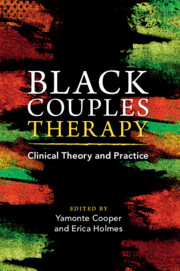Book contents
- Black Couples Therapy
- Black Couples Therapy
- Copyright page
- Contents
- Figures
- Tables
- Contributors
- Foreword
- Acknowledgments
- Introduction
- Part I Race, Racism, and Identity
- Part II Foundations for Healthy Coupling
- Part III Adapting Major Therapeutic Approaches for Work with African American Couples
- Chapter 6 Emotionally Focused Therapy with Black Couples
- Chapter 7 Use of the Gottman Method with African American Couples Impacted by Post-Traumatic Slave Syndrome
- Chapter 8 Transcending the Binary: A Narrative Therapy Approach to Work with Black Trans Men Navigating Gender Transition with Romantic Partners
- Chapter 9 Imago Therapy and the African American Couple
- Chapter 10 African American Narratives of Trauma: An EMDR Approach to Tapping into the Strengths of Black Love
- Part IV Sex and Intimacy
- Part V Special Topics
- Index
- References
Chapter 7 - Use of the Gottman Method with African American Couples Impacted by Post-Traumatic Slave Syndrome
from Part III - Adapting Major Therapeutic Approaches for Work with African American Couples
Published online by Cambridge University Press: 27 July 2023
- Black Couples Therapy
- Black Couples Therapy
- Copyright page
- Contents
- Figures
- Tables
- Contributors
- Foreword
- Acknowledgments
- Introduction
- Part I Race, Racism, and Identity
- Part II Foundations for Healthy Coupling
- Part III Adapting Major Therapeutic Approaches for Work with African American Couples
- Chapter 6 Emotionally Focused Therapy with Black Couples
- Chapter 7 Use of the Gottman Method with African American Couples Impacted by Post-Traumatic Slave Syndrome
- Chapter 8 Transcending the Binary: A Narrative Therapy Approach to Work with Black Trans Men Navigating Gender Transition with Romantic Partners
- Chapter 9 Imago Therapy and the African American Couple
- Chapter 10 African American Narratives of Trauma: An EMDR Approach to Tapping into the Strengths of Black Love
- Part IV Sex and Intimacy
- Part V Special Topics
- Index
- References
Summary
This chapter explores the trauma and challenges Black couples have faced along with the impact of Dr. Joy DeGruy’s theory of Post-Traumatic Slavery Syndrome (PTSS). The central theory of the Gottman Method for couples therapy is reviewed along with special considerations that should be given and ways it can be enhanced in work with Black couples. Specific Gottman interventions aree explored along with how they can be aligned with trauma informed/culturally responsive care. Case conceptualizations of three African American couples who have been impacted by PTSS and treated using Gottman Method interventions are also presented.
- Type
- Chapter
- Information
- Black Couples TherapyClinical Theory and Practice, pp. 166 - 192Publisher: Cambridge University PressPrint publication year: 2023

